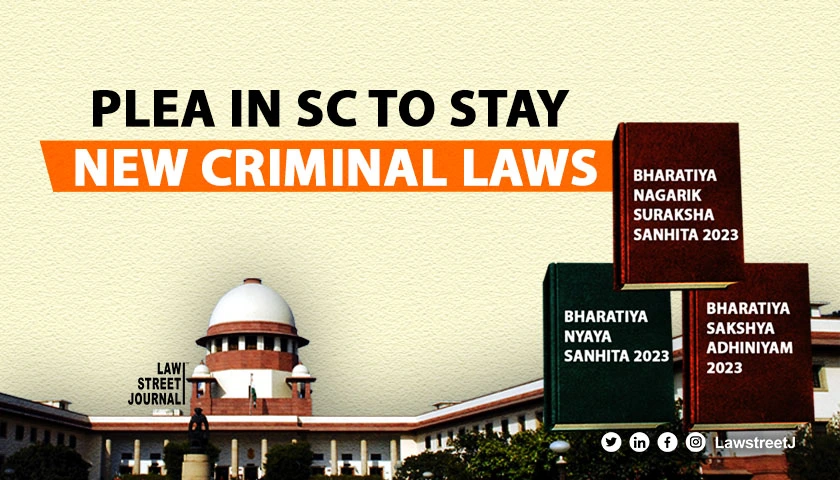New Delhi: A public interest litigation (PIL) has been moved in the Supreme Court seeking to constitute an expert committee to assess and identify the viability of the three newly amended criminal laws.
The PIL has been filed by Anjale Patel and Chhaya through advocates Sanjeev Malhotra and Kunwar Siddhartha against the new amended criminal law bills: The Bharatiya Nyaya Sanhita, 2023; The Bharatiya Sakshya Adhiniyam, 2023; and The Bharatiya Nagarik Suraksha (Second) Sanhita, 2023.
"Please issue notice for a writ of mandamus or any other appropriate writs seeking issuance of specific directions, policies, and regulations to immediately constitute an expert committee to assess and identify the viability of the three new amended criminal laws named as The Bharatiya Nyaya Sanhita, 2023, The Bharatiya Nagrik Suraksha Sanhita, 2023, and The Bharatiya Sakshya Adhiniyam, 2023, with the aim to overhaul the criminal laws of the country and abolish the Indian Penal Code, 1860, the Code of Criminal Procedure, and the Indian Evidence Act, 1872," the petitioner urged.
Also Read: BCI urges Bar Associations to refrain from strikes over new criminal laws
The petition has also prayed to stay the operation and implementation of the three new criminal laws.
The petition claims that the new criminal laws were passed with minimal public participation, leading to no debate on the elements of the bills.
The petition highlights various issues with the new bills, stating that they suffer from many defects and discrepancies. It asserts that although the bills claim to replace old colonial laws, the primary symbol of colonial rule, the police system, continues unchanged since British times and needs reforms. The petition also claims that the new laws grant 15 days of police custody, which can be taken in parts during the initial 40 or 60 days of the 60 or 90 days period of judicial custody, potentially causing denial of bail to the accused for the entire period if the police have not exhausted the entire period of custody.
Also Watch: LawStreet Journal Report
"The introduction of new criminal bills can potentially impact lawyers in various ways, posing a range of challenges. Here are some problems that lawyers may face with the introduction of new criminal bills:
1. Increased Workload: New criminal bills may lead to a surge in legal cases, thereby increasing the workload for lawyers. This can lead to stretched resources and potential challenges in providing timely and effective legal representation.
2. Complexity and Ambiguity: The introduction of new criminal bills may bring about complex legal provisions, ambiguous language, or intricate procedural requirements. Lawyers may face challenges in interpreting and navigating these complexities, potentially leading to delays and legal uncertainties.
3. Continuing Legal Education: Lawyers may need to invest additional time and resources to stay abreast of the new criminal laws, necessitating continuing legal education and training to ensure competence in handling cases under the new legal framework.
4. Impact on Legal Practice: The introduction of new criminal bills may necessitate adjustments in legal practice, requiring lawyers to adapt their strategies, case preparations, and advocacy techniques to align with the evolving legal landscape.
5. Increased Legal Scrutiny: Lawyers representing clients in criminal cases may face heightened scrutiny and accountability under the new bills, potentially facing challenges related to ethical considerations, client confidentiality, and adherence to the revised legal standards.
6. Resource Constraints: Small and mid-sized law firms, as well as individual practitioners, may face resource constraints in terms of updating legal libraries, accessing updated case law references, and acquiring the necessary resources to effectively represent clients under the new criminal bills," the petition said.
The introduction of new criminal bills may impact access to legal aid and pro bono services, potentially leading to challenges in offering comprehensive legal assistance to marginalized and underserved populations, the petition said.

















